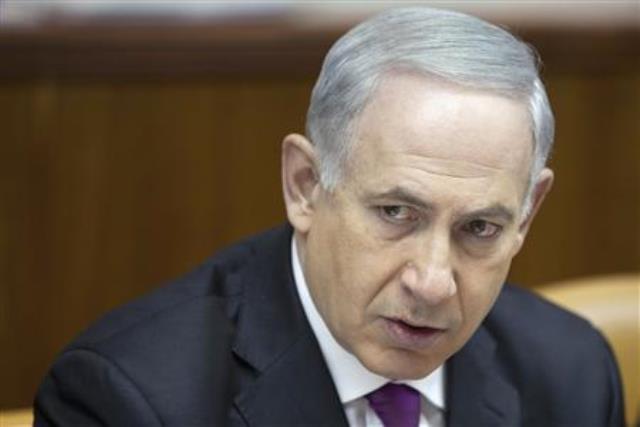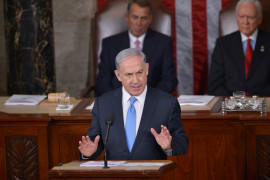
Israeli Prime Minister Benjamin Netanyahu warned US President Barack Obama on Tuesday against accepting a nuclear deal with Iran that would be a ‘countdown to a potential nuclear nightmare’ by a country that “will always be an enemy of America”.
“If the deal now being negotiated is accepted by Iran, that deal will not prevent Iran from developing nuclear weapons – it will all but guarantee that Iran will get those nuclear weapons - lots of them,” the Israeli leader said in a 39-minute speech to the US Congress that offered a point-by-point critique of Obama’s Iran diplomacy.
In an appearance that strained US-Israeli relations and was boycotted by dozens of Obama’s fellow Democrats, Netanyahu said Iran’s regime was ‘as radical as ever,’ could not be trusted and the deal being worked out with world powers would not block Iran’s way to a bomb “but paves its way to a bomb”.
“This deal won’t be a farewell to arms, it will be a farewell to arms control ... a countdown to a potential nuclear nightmare,” Netanyahu told lawmakers and visitors in the House of Representatives. His speech drew 26 standing ovations.

Earlier, he entered the chamber to a cacophony of cheers and applause, shaking hands with dozens of lawmakers, including House Speaker John Boehner, before taking a podium and telling lawmakers he was deeply humbled.
At the start of the speech, he sought to defuse the intense politicisation of his appearance, which has hardened divisions between Republicans and Democrats over the White House’s approach to stopping Iran from obtaining nuclear weapons. He said he was grateful to Obama for his public and private support of Israel, including US military assistance and contributions to Israel’s Iron Dome anti-missile system.
“I regret that some see my appearance here as political,” he said. “I know that no matter which side of the aisle you sit on, you stand with Israel.”
The speech escalated Netanyahu’s campaign against Obama’s Iran diplomacy, putting unprecedented stress on the two leaders’ ties. Although given the cold shoulder by the US administration, Netanyahu on Monday offered an olive branch, saying he meant no disrespect to Obama by accepting an invitation to speak to US lawmakers that was orchestrated by the president’s rival Republicans.
He said the United States should not ease its restrictions until Iran ‘changes its behaviour’, a comment that could stiffen support among Republicans to maintain US sanctions on Iran or seek to escalate them. But the Israeli leader did not specifically call for new penalties, something Obama has said would undermine ongoing talks and would prompt a veto if passed by Congress.
“If the world powers are not prepared to insist that Iran change its behaviour before a deal is signed, they should at the very least be prepared to insist that Iran changes its behavior before the deal expires,” he said. He added that the drop in oil prices put the United States and other countries in a stronger position to negotiate with Iran. “Iran’s nuclear program can be rolled back well beyond the current proposal by insisting on a better deal and keeping up the pressure on a very vulnerable regime, especially given the recent collapse of the price of oil.” As many as 59 of the 232 members of Congress from Obama’s Democratic Party sat out the address to protest what they see as a politicisation of Israeli security, an issue on which Congress is usually united. The absence of so many lawmakers could raise political heat on Netanyahu at home two weeks before an Israeli general election.
Earlier President Obama said Iran should commit to a verifiable freeze of at least 10 years on its nuclear activity for an atomic deal to be reached, but said the odds were still against sealing a final agreement.
“If, in fact, Iran is willing to agree to double-digit years of keeping their program where it is right now and, in fact, rolling back elements of it that currently exist ... if we’ve got that, and we’ve got a way of verifying that, there’s no other steps we can take that would give us such assurance that they don’t have a nuclear weapon,” he told Reuters in an interview.
Obama said a rift over Netanyahu’s speech to Congress opposing the Iran deal was a distraction that would not be ‘permanently destructive’ to US Israeli ties.
Iran, however, rejected as ‘unacceptable’ President Obama’s demand, but said it would continue talks aimed at securing a deal, Iran’s semi-official Fars news agency reported. “Iran will not accept excessive and illogical demands,” Iranian Foreign Minister Mohammad Javad Zarif was quoted as saying by Fars. “Obama’s stance ... is expressed in unacceptable and threatening phrases ... ,” he reportedly said, adding that negotiations under way in Switzerland would nonetheless carry on.
Under a 2013 interim deal, the United States and five other powers agreed in principle to let Iran maintain limited uranium enrichment technologies. US National Security Adviser Susan Rice argued on Monday that this commitment could not be undone. A deal with Iran is far from guaranteed, given US assessments that more than a decade of carrot-and-stick diplomacy with Iran might again fail to clinch a final accord.
Published in The Express Tribune, March 4th, 2015.












































COMMENTS
Comments are moderated and generally will be posted if they are on-topic and not abusive.
For more information, please see our Comments FAQ